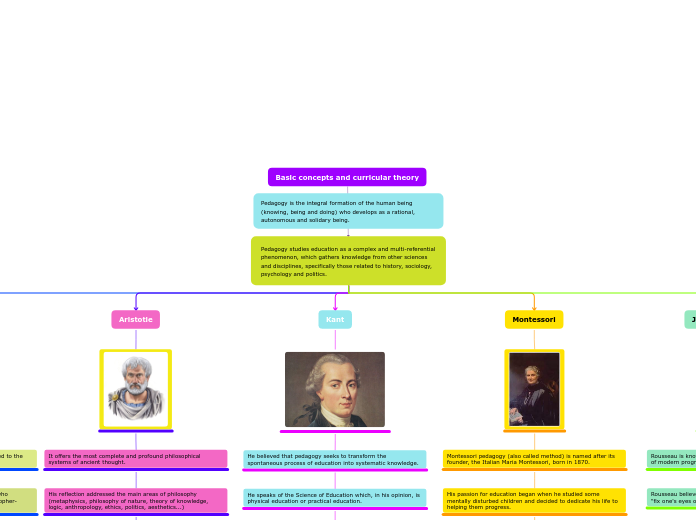par WENDY DAYANA CONDOR SARAGOSIN Il y a 4 années
450
Basic concepts and curricular theory

par WENDY DAYANA CONDOR SARAGOSIN Il y a 4 années
450

Rousseau believed that natural processes are best advised to "fix one's eyes on nature, to follow the path marked out by it".
Rousseau develops naturalistic education from birth to adulthood.
For Rousseau the process of education in the child should start from the understanding of the child's nature, knowing his interests and particularities.
Interaction with the physical world through play is one of the ways in which the child begins to know.
Through these practices the child could develop a sense of discernment.
His passion for education began when he studied some mentally disturbed children and decided to dedicate his life to helping them progress.
In 1907, he founded the first Children's Home, in San Lorenzo, Rome, in which there was a practical living space, a house made to the scale of the little ones, where they practiced hygiene and manners.
He speaks of the Science of Education which, in his opinion, is physical education or practical education.
The student must show submission and passive obedience in this first governs a mechanical force that relies on exercise and discipline.
A moral force is present which is based on maxims.
The student is allowed to make use of his capacity for reflection and his freedom which is determined or guided by the laws that govern society.
His reflection addressed the main areas of philosophy (metaphysics, philosophy of nature, theory of knowledge, logic, anthropology, ethics, politics, aesthetics...)
In all fields, although influenced by his teacher Plato, he made original contributions.
Aristotle's philosophy will dominate Western thought, both philosophical and scientific, until the appearance of new systems in the Renaissance (Galileo) and the Modern Age (rationalism, empiricism, Kant).
In the society he imagined, there were guardians who governed it, and the principal ones were the philosopher-rulers.
With preparation and endowed with 15 years of practical experience as "higher officials," they were able to rule justly and society was in harmony with the "forms" of ultimate reality.
The core of Plato's philosophy is his theory of forms or ideas.
Basically, his idea of knowledge, his ethical theory, his psychology, his concept of the state and his conception of art must be understood from that perspective.